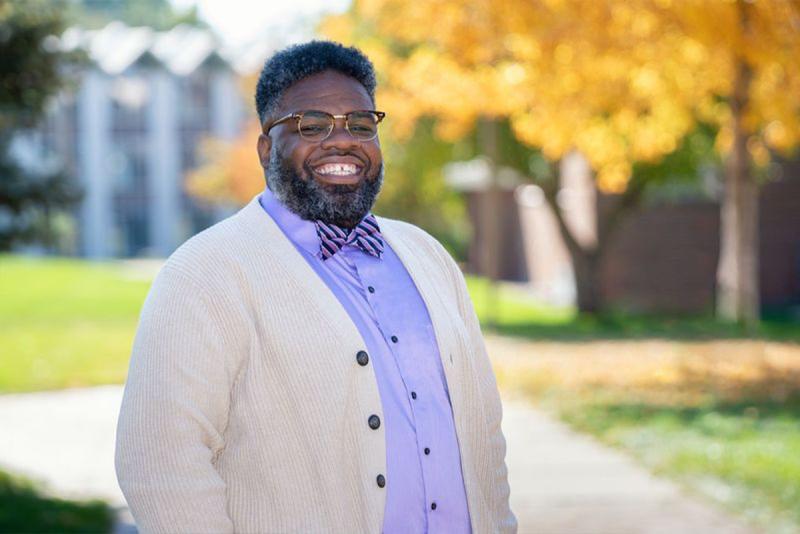Addressing Health Inequities
Prof. Tyrone Hamler studies health equity in kidney disease for older Black Americans

Across his research,University of Denver Graduate School of Social Work Assistant Professor Tyrone Hamler has a singular aim to help people who are facing a difficult yet inevitable part of life: illness and death.
“Just as being born, these things happen too. That’s the price you pay to experience this life,” says Hamler, whose own father died when Hamler was a 23-year-old BSW student completing a hospice internship. Through his own experiences and those of the patients and families he has worked with as a hospital and dialysis social worker, he’s seen that “you’re going to learn to incorporate that loss into your life. You don’t ever get over it or move on. Some days will be good and some days are not. And it’s your own journey — everyone’s journey is unique.”
“That’s part of the work I like,” Hamler adds. “It’s human experience that’s happening. It’s not predictable. It’s messy.”
Hamler’s research is focused on health inequities, chronic illness, aging, and the intersection of mental and physical health. He also studies health equity in kidney disease for older Black Americans, who he says experience “double jeopardy” because they are older and members of an historically excluded group. More than 1 in 7 U.S. adults have chronic kidney disease, which is more prevalent among Black adults (20%) than those who are white (12%).
The ultimate goal of his research, Hamler says, is that kidney disease patients never get to the later stages of disease — “that we can mobilize support around people so folks never have to experience Stage 4 or Stage 5” when they have to make tough decisions about things like dialysis and transplantation. Hamler hopes his work can help to reshape kidney care in the United States, creating a sort of “one-stop shop” for comprehensive kidney care, where patients at all stages of disease can access both medical care and a community of support. That, Hamler says, would be a “game changer.”
“What my work seeks to do is patient centered — to identify supports and areas of intervention that can help folks with their mental, physical and emotional symptoms,” he explains.
Hamler has a particular interest in care transitions during the progression of chronic kidney disease. His doctoral dissertation focused on care transitions during late-stage chronic kidney disease. Now, a new project will explore transplantation in more depth. In partnership with the Donor Alliance — the organ procurement organization for Colorado and Wyoming — Hamler will be studying the aftercare experiences of donor families, recipients and aftercare workers.
“The act of donation is lifesaving, but it’s also associated with really complex emotions. That’s where aftercare services come in,” says Hamler. Donor families and recipients may experience complex grief. For instance, he explains, a recipient may on one hand be grateful for the gift they’re receiving while also grieving for a family they’ve never met. Aftercare workers may experience secondary traumatic stress in their work with people who are bereaved. Hamler’s hope is that findings can highlight the work that the Donor Alliance is engaged in and guide program enhancements for Donor Alliance and similar organizations, ultimately helping all of those impacted by organ donation to experience better outcomes.
As a first-generation college graduate, Hamler now mentors students from similar backgrounds. He’s a new fellow in the American Psychological Association Leadership and Education Advancement Program (LEAP), a mentoring and leadership development program for early career behavioral scientists from underrepresented racial and ethnic populations. The fellowship will help him work toward his goal of securing a research grant from the National Institute of Diabetes and Digestive and Kidney Diseases (part of the National Institutes of Health); it also helps fellows learn to effectively manage a grant, including leading a research team. Hamler also serves on the Gerontological Society of America Minority Issues in Gerontology Advisory Panel.
Meanwhile, he has several manuscripts at various stages of the publication process. He coauthored a recent paper published in BMC Public Health that explores the role of social isolation in anxiety disorders among adults in the United States. He also coauthored a chapter — “Radically Imagining Anti-Racist Social Work Research Using a Trauma-Informed, Socially-Just Framework” in the new book Social Work, White Supremacy, and Racial Justice: Reckoning with Our History, Interrogating our Present, Re-Imagining our Future; Hamler and the other chapter authors are writing a related invited paper for an antiracist methodology special issue of the Journal of the Society for Social Work and Research.
Authored with MSW student Asia Cutforth and colleagues at Case Western Reserve University, another of Hamler’s latest papers discusses findings of a qualitative study of the role of family influence in treatment decision-making in chronic kidney disease. A second investigation explored whether the racial and ethnic composition of neighborhoods was related to depressive symptoms among middle aged and older adult residents; the authors found that although neighborhood racial and ethnic composition wasn’t related to depressive symptoms in this population, individuals’ own race/ethnicity was.
Yet another manuscript shares recommendations to advance social connectedness in chronic kidney disease care. Recommendations to alleviate social isolation — one of the Grand Challenges for Social Work — include engaging family caregivers, improving detection of social isolation, implementing evidence-based social support interventions, and using technology for social connection.
“Folks have those needs when they have a chronic illness, but as a profession, we’re behind a little bit,” Hamler says. “Let’s utilize technology not just to communicate results and have appointments, but to build connections and community. Let people know they have someone they can just chat up and run things by so they don’t feel alone.”




